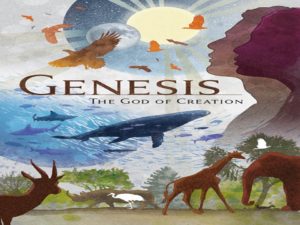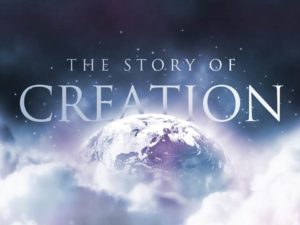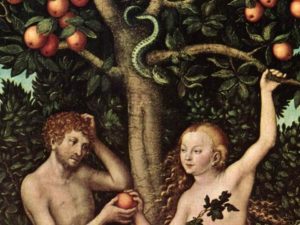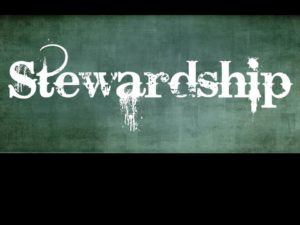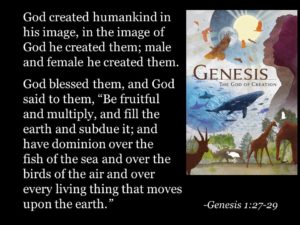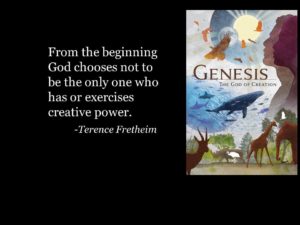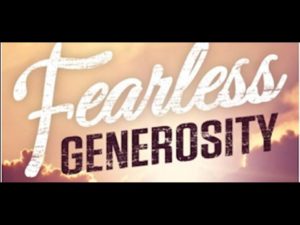But what does it mean to show Fearless Generosity? Can we trust that in creation God has provided everything that we need to thrive – that the resources are there – the gifts and abilities to overcome challenges are all there – that there is nothing that we can’t overcome because we are made in God’s image to reflect God’s creative presence in the world.
Genesis 1:20-2:4
And God said, “Let the waters bring forth swarms of living creatures, and let birds fly above the earth across the dome of the sky.” So God created the great sea monsters and every living creature that moves, of every kind, with which the waters swarm, and every winged bird of every kind. And God saw that it was good. God blessed them, saying, “Be fruitful and multiply and fill the waters in the seas, and let birds multiply on the earth.” And there was evening and there was morning, the fifth day.
And God said, “Let the earth bring forth living creatures of every kind: cattle and creeping things and wild animals of the earth of every kind.” And it was so. God made the wild animals of the earth of every kind, and the cattle of every kind, and everything that creeps upon the ground of every kind. And God saw that it was good.
Then God said, “Let us make humankind in our image, according to our likeness; and let them have dominion over the fish of the sea, and over the birds of the air, and over the cattle, and over all the wild animals of the earth, and over every creeping thing that creeps upon the earth.”
So God created humankind in his image, in the image of God he created them; male and female he created them.
God blessed them, and God said to them, “Be fruitful and multiply, and fill the earth and subdue it; and have dominion over the fish of the sea and over the birds of the air and over every living thing that moves upon the earth.” God said, “See, I have given you every plant yielding seed that is upon the face of all the earth, and every tree with seed in its fruit; you shall have them for food. And to every beast of the earth, and to every bird of the air, and to everything that creeps on the earth, everything that has the breath of life, I have given every green plant for food.” And it was so. God saw everything that he had made, and indeed, it was very good. And there was evening and there was morning, the sixth day.
Thus the heavens and the earth were finished, and all their multitude. And on the seventh day God finished the work that he had done, and he rested on the seventh day from all the work that he had done. So God blessed the seventh day and hallowed it, because on it God rested from all the work that he had done in creation. These are the generations of the heavens and the earth when they were created.
The two creation stories of scripture – God using 7 days to create the Earth and everything in it in Chapter 1 and the story of Adam and Eve in Chapter 2 – they both bring such vivid images to mind.
Maybe that is because, for many of us, they may be some of the first Bible stories we ever heard. And perhaps we heard them at a time when our imaginations were captured and ignited with this incredible story of God – God who was creative and imaginative and loving and interested in beauty and majesty and enjoyment.
By the time we get to Adam and Eve, the story gets all too real – there are heroes and villains – there is joy and revelation – there is heartbreak and disappointment. We begin to get a sense of what it means to be human – what it means to live this life in relationship with each other and in relationship with our Creator.
What a fascinating and intense way to start out the Biblical witness in these first two chapters of Genesis.
Currently in Confirmation Class, we have entered into the Bible year. We rotate – one year is the Bible and the other year is the Lutheran Small Catechism and Lutheran Living. The one thing I find incredibly frustrating is that we essentially are covering a book or collection of books of the Bible every class session. The first week was Genesis – all of it. We could spend the whole year on the stories found in Genesis.
But the part that is hard for me is all of the great questions that come up from the kids. For example in Genesis 1:26, when God says:
“Let us make humankind in our image, according to our likeness…”
Who is the US? Who is the OUR? Who is God hanging out with as creation unfolds?
Or another question, we know how creation happened, but who created God?
Or another one, is it really possible that every human being has descended from Adam and Eve?
Or finally, one of my favorites – where do the dinosaurs fit in?
You see, there is a lot to dive into when our imaginations are provoked and we begin to wonder about how it all works and who God is for us – and who we are for God.
This week we have entered into that time of the year known as Stewardship Season – that dreaded time for many churches and even for some pastors too. I think the dread comes when it is assumed that Stewardship is just about money – because if it is just about money – then it is just a big, institutional fundraiser.
But we know that this whole stewardship thing is much, much bigger than money. And the reason we know that, is that it is right there in the first chapter of Genesis:
God created humankind in his image, in the image of God he created them; male and female he created them. God blessed them, and God said to them, “Be fruitful and multiply, and fill the earth and subdue it; and have dominion over the fish of the sea and over the birds of the air and over every living thing that moves upon the earth.” (Genesis 1:27-29)
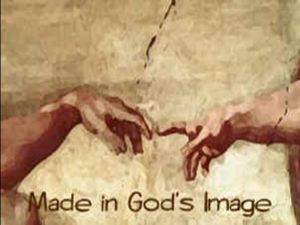
In thinking about stewardship, there are a couple of things here not to be missed – first that we are created in the image of God – that is to say that humankind is given the gifts necessary to care for the creation that has been made. To be made in the image of God is to mirror God to the world. (Terence Fretheim, New Interpreter’s Bible – p.345).
And the second thing not to be missed – and the church messed this up for a long time – that there is no hierarchy between males and females as God created them – in other words the female mirrors the divine image as much as the male.
In making both women and men – God values the unique gifts that each has to offer and also what they are able to do together – that from the beginning, the intention of creation was that men and women were of equal worth and both made in God’s image.
And we also learn that God created humankind with an express purpose – to have dominion over everything. And not only dominion, but God sets up humankind as a kind of partner – a co-creator – an extension of God’s own presence and power in creation.
From the beginning God chooses not to be the only one who has or exercises creative power (Fretheim, NIB – p. 346). Isn’t that an amazing statement? Exercising that creative power – being an extension of God in the world – that is called Stewardship.
Of course, we can get tripped up by the phrases “have dominion over” and “subdue”. For me, terrible images of strip mining, and clearcutting of forests, and pollution of waterways and the hunting of animals to the point of extinction. And sadly, these words from Genesis have been used to justify many of these kinds of actions over the centuries.
But clearly, this is not what this command to “have dominion over” is meant to convey. Instead, to have dominion is to be understood in terms of care-giving, even nurturing. As those created in the image of God, human beings should relate to creation as God relates to human beings. (Fretheim, 346)
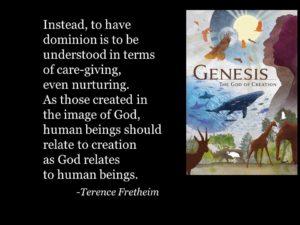
So, we have this firm foundation and legacy for ourselves – we are created in God’s image to care for and to steward all that we have been given – to be an extension of God in the world. God has provided everything that is necessary not only for humankind to survive, but to thrive. And implicit in these gifts from God is a spirit of generosity that resonates throughout.
And yet we look around and we see greed and corruption. We witness selfishness. We wonder sometimes how things can ever change in the world when the challenges are so great and the obstacles so many.
Pr Sarah and I served our first congregations in rural, central Pennsylvania – there were three congregations – two in coal country, one in Pennsylvania Dutch country – fascinating places and people. St. John’s in Leck Kill PA was the Pennsylvania Dutch congregation – it was a farming community and really a family church – everyone was related and that is not an exaggeration. Many families were 4 generations alive and active in the congregation.
“Amanda” was in her 30’s – she was one of three sisters in the church each with families of their own – mom still active in the congregation – and Amanda found herself serving on the council. And there were some important issues that had arisen that the council was working on.
I will never forget that moment when it finally occurred to Amanda – and it washed right over her face – that moment when she realized that it was now her time. It was her time to stand up and be a leader. It was her time to make use of the gifts that she had been given.
No longer did she need to defer to her mom or her older sisters. Instead of looking around for someone else – Amanda recognized her own ability – her own responsibility to respond to the challenges and opportunities in front of her. And she did.
This fall’s Stewardship emphasis is entitled “Fearless Generosity”. I feel honored to be a part of a congregation that has such a tradition and culture of being generous with its resources – financially for sure – but also in terms of time and abilities – all of it.
Hopefully, you had a chance to read Bruce Andersen’s story in the mailing this week about his involvement with Habitat for Humanity and the Haboholics. This morning Bill Long will be sharing his experience with us and in the weeks to come we’ll be hearing from a number of other Gloria Dei members about their passions for service and the ways they steward their resources not just at Gloria Dei, but in other places and organizations too.
But what does it mean to show Fearless Generosity or to fearlessly live? For me it goes back to Genesis 1 and to Amanda at St. John’s in Leck Kill, PA.
We can be fearless in our generosity because we can trust that in creation God has provided everything that we need to thrive – that the resources are there – the gifts and abilities to overcome challenges are all there – that there is nothing that we can’t overcome because we are made in God’s image to reflect God’s creative presence in the world. We find all of this in those beginning verses of Genesis.
And I also go back to Amanda from St. John’s to be reminded that this is not a time to look around and hope that someone else will raise their hand and rise to the challenges in the world. That because of what God provides for us – we are each able to respond and offer ourselves and our resources in ways that will undoubtedly affect and impact the people and the world around us.
And we can be fearless in our generosity because, as Amanda knew and we know too – we are not alone – that is the genius of the human community that God has created – we are able to enjoy the strength and encouragement of each other – trusting in God’s promise to always be there.
Because of that promise, we can accept the invitation to join in God’s creating, sustaining and redeeming work – to be fearless stewards of all that God has entrusted to our care.
Let us pray…Amen.
Rev. John Berg
Gloria Dei Lutheran Church (ELCA)
Northbrook, IL

